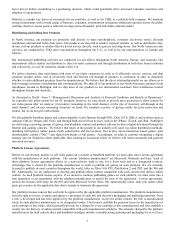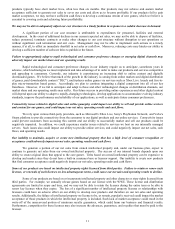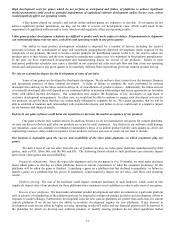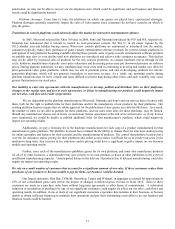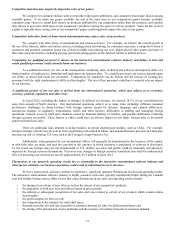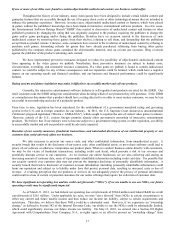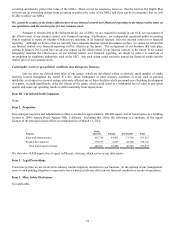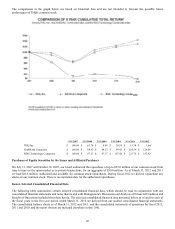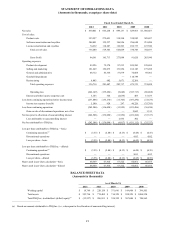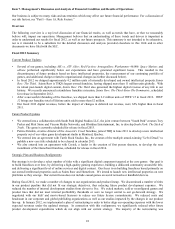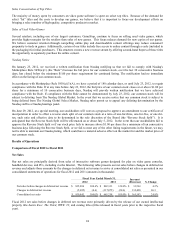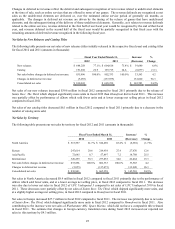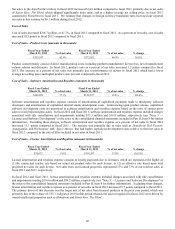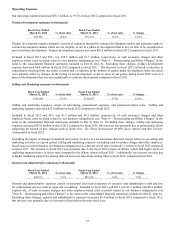THQ 2012 Annual Report Download - page 25
Download and view the complete annual report
Please find page 25 of the 2012 THQ annual report below. You can navigate through the pages in the report by either clicking on the pages listed below, or by using the keyword search tool below to find specific information within the annual report.17
If one or more of our titles were found to contain objectionable undisclosed content, our business could suffer.
Throughout the history of our industry, many video games have been designed to include certain hidden content and
gameplay features that are accessible through the use of in-game cheat codes or other technological means that are intended to
enhance the gameplay experience. However, in some cases, objectionable undisclosed content or features, which were placed
in games without the publishers' knowledge, have been found in interactive entertainment software products. In a few cases,
the Entertainment Software Ratings Board (“ESRB”) has reacted to discoveries of undisclosed content and features in other
publisher's products by changing the rating that was originally assigned to the product, requiring the publisher to change the
game and/or game packaging and/or fining the publisher. Retailers have on occasion reacted to the discovery of such
undisclosed content by removing these games from their shelves, refusing to sell them, and demanding that the publishers
accept them as product returns. Likewise, some consumers have reacted to the revelation of undisclosed content by refusing to
purchase such games, demanding refunds for games they have already purchased, refraining from buying other games
published by the company whose game contained the objectionable material, and, on at least one occasion, filing a lawsuit
against the publisher of the product containing such content.
We have implemented preventive measures designed to reduce the possibility of objectionable undisclosed content
from appearing in the video games we publish. Nonetheless, these preventive measures are subject to human error,
circumvention, overriding, and reasonable resource constraints. If a video game we publish is found to contain undisclosed
content, we could be subject to any of these consequences and our reputation could be harmed, which could have a negative
impact on our operating results and financial condition, and our business and financial performance could be significantly
harmed.
Rating systems and future legislation may make it difficult to successfully market and sell our products.
Currently, the interactive entertainment software industry is self-regulated and products are rated by the ESRB. Our
retail customers take the ESRB rating into consideration when deciding which of our products they will purchase. If the ESRB
or a manufacturer determines that a product should have a rating directed to an older or more mature consumer, we may be less
successful in our marketing and sales of a particular product.
From time to time, legislation has been introduced for the establishment of a government mandated rating and governing
system in the U.S. and in foreign countries for our industry. In 2011, the U.S. Supreme Court declared as unconstitutional
California's proposed legislation (“Brown v. EMEA/ESA”), which sought to regulate the sale of violent video games to minors.
However, outside of the U.S., various foreign countries already allow government censorship of interactive entertainment
products. We believe that if our industry were to become subject to a government rating system or other regulation, our ability
to successfully market and sell our products could be adversely impacted.
Breaches of our security measures, fraudulent transactions, and unintended disclosures of our intellectual property or our
customer data could adversely affect our business.
We take measures to prevent our source code, and other confidential information, from unauthorized access. A
security breach that results in the disclosure of our source code, other confidential assets, or pre-release software could lead to
piracy of our software or otherwise compromise our product plans. When we conduct business online directly with consumers,
we may be the victim of fraudulent transactions, including credit card fraud, which presents a risk to our revenues and
potentially disrupts service to our customers. As we increase our online businesses, we are also collecting and storing an
increasing amount of customer data, some of it personally identifiable information including credit card data. It is possible that
our security controls over customer data may not prevent the improper disclosure of personally identifiable information. A
security breach that leads to disclosure of customer account information (including personally identifiable information) could
harm our reputation and subject us to liability under laws that protect personal data, resulting in increased costs or loss of
revenue. A resulting perception that our products or services do not adequately protect the privacy of personal information
could result in a loss of current or potential customers for our online offerings that require the collection of customer data.
We have significant net operating loss and tax credit carryforwards ("NOLs"). If we are unable to use our NOLs, our future
operating results may be significantly impacted.
As of March 31, 2012, we had federal net operating loss carryforwards of $584.6 million and federal R&D tax credit
carryforwards of $26.1 million. Under applicable tax rules, we may "carry forward" these NOLs in certain circumstances to
offset any current and future taxable income and thus reduce our income tax liability, subject to certain requirements and
restrictions. Therefore, we believe that these NOLs could be a substantial asset. However, if we experience an "ownership
change," as defined in Section 382 of the Internal Revenue Code, our ability to use the NOLs could be substantially limited,
which could significantly increase our future income tax liability. On May 12, 2010, we entered into a Section 382 Rights
Agreement with Computershare Trust Company, N.A., as rights agent, in an effort to prevent an "ownership change" from


